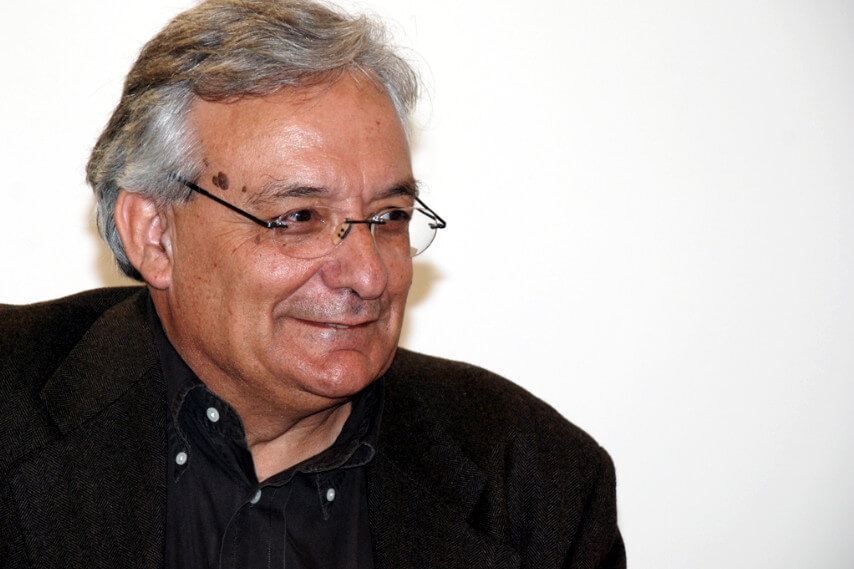Fernando Rosas

História Política Comparada – Regimes, Transições, Colonialismo e Memória
Contacto:
fernandorosas.ihc@fcsh.unl.pt
Biografia
Fernando Rosas (Lisboa, 1946) é professor catedrático jubilado no departamento de História da Faculdade de Ciência Sociais e Humanas da Universidade NOVA de Lisboa e Investigador no Instituto de História Contemporânea da mesma instituição, do qual foi fundador e Presidente da Direcção entre 1994 e Fevereiro de 2013.
Entre 1988 e 1995, integrou o conselho de redacção da revista Penélope – Fazer e Desfazer a História. Entre 1994 e 2007, dirigiu a revista História. Publicou variadíssimas obras como autor, dirigiu, coordenou e é co-autor de muitas outras na área da sua especialidade (História do século XX), entre elas: As primeiras eleições legislativas sob o Estado Novo: as eleições de 16 de Dezembro de 1934, (1985); O Estado Novo nos Anos 30. Elementos para o Estudo da Natureza Económica e Social do Salazarismo (1928-1938), (1986); O salazarismo e a Aliança Luso-Britânica : estudos sobre a política externa do Estado Novo nos anos 30 a 40, (1988); Salazar e o Salazarismo (co-autor), (1989); Portugal Entre a Paz e a Guerra (1939/45), (1990); Portugal e o Estado Novo (1930/60), (co-autor), (1992); História de Portugal, vol. VII – O Estado Novo (1926/74), (1994); Dicionário de História do Estado Novo, (dir.), (1995); Portugal e a Guerra Civil de Espanha, (coord.), (1996); Armindo Monteiro e Oliveira Salazar : correspondência política, 1926-1955, (coord.) (1996); Salazarismo e Fomento Económico, (2000); Portugal Século XX : Pensamento e Acção Política, (2004); Lisboa Revolucionária, Roteiros dos Confrontos Armados no Século XX, (2007); História da Primeira República Portuguesa, (co-coord.), (2010); Salazar e o Poder. A Arte de Saber Durar (2012); Estado Novo e Universidade. A perseguição aos Professores, (co-autor), (2013); O Adeus ao Império. 40 Anos de Descolonização Portuguesa (co-coord.), (2015).
Foi deputado à Assembleia da República em 2000 e 2001 e de 2005 a 2010.
Áreas de Investigação
- História do século XX
- Estado Novo
- Revolução dos Cravos
- História comparada do Fascismo
- Autoritarismo, democracia e modernização
Publicações destacadas
- Rosas, Fernando. História e Memória. Lisboa: Tinta da China, 2016. [link]
- Rosas, Fernando, Mário Machaqueiro & Pedro Aires Oliveira (Orgs.). O Adeus ao Império – 40 Anos de Descolonização Portuguesa. Lisboa: Nova Vega, 2015. [link]
- Rosas, Fernando & Cristina Sizifredo. Estado Novo e Universidade: A Perseguição aos Professores. Lisboa: Tinta da China, 2013. [link]
- Rosas, Fernando. Salazar e o Poder: A Arte de Saber Durar. Lisboa: Tinta da China, 2012. [link]
- Rosas, Fernando & Álvaro Garrido (Coords.). Corporativismo, Fascismos, Estado Novo. Coimbra: Almedina. [link]
- Rosas, Fernando & Maria Fernanda Rollo. História da Primeira República Portuguesa.Lisboa: Tinta da China, 2009. [link]
- Rosas, Fernando. Lisboa Revolucionária. Lisboa: Tinta da China, 2007. [link]
Projectos principais
- Coordenador do projecto “Trabalhadores forçados portugueses no Terceiro Reich” — Acolhido pelo IHC e financiado pela EVZ – Erinnerung, Verantwortung, Zukunft. 2015-2017
- Investigador do projecto “Estado e memória: políticas públicas da memória da ditadura portuguesa (1974-2009)” — Coordenado por Manuel Loff e financiado pela Fundação para a Ciência e Tecnologia (PTDC/HIS-HIS/121001/2010).
- Coordenador do projecto “Luta Armada em Portugal durante o Marcelismo (1968-74) num contexto europeu” — Acolhido pelo IHC e financiado pela Fundação para a Ciência e Tecnologia (PTDC/HIS-HIS/101323/2008).
- Coordenador do projecto “A Nova República do Pós-Guerra (1919-1926). O caso português em perspectiva comparada na Europa do Sul” — Acolhido pelo IHC e financiado pela Fundação para a Ciência e Tecnologia (PTDC/HIS-HIS/102287/2008).
- Coordenador do projecto “Agricultura e desenvolvimento em Portugal (1914-1986)” — Acolhido pelo IHC e financiado pela Fundação para a Ciência e Tecnologia (POCI/HAR/61098/2004).
Pesquisa
Agenda
julho, 2025
Tipologia do Evento:
Todos
Todos
Apresentação
Ciclo
Colóquio
Conferência
Congresso
Curso
Debate
Encontro
Exposição
Inauguração
Jornadas
Lançamento
Mesa-redonda
Mostra
Open calls
Outros
Palestra
Roteiro
Seminário
Sessão de cinema
Simpósio
Workshop
- Event Name
seg
ter
qua
qui
sex
sab
dom
-
1
2
3
4
5
6
7
8
9
10
11
12
13
14
15
16
17
18
19
20
21
22
23
24
25
26
27
28
29
30
31
Não Existem Eventos
Notícias
Ricardo Noronha lidera equipa que vai estudar ‘petromodernidade’
Jul 7, 2025
O projecto PETROSINES foi um dos seis projectos de História que receberam financiamento da FCT
Comunicado sobre as Demolições no Bairro de Santa Filomena
Jul 3, 2025
Comunicado da equipa do projecto FILMASPORA
VINCULUM é reconhecido com Prémio da UE para a Ciência Cidadã
Jun 20, 2025
A candidatura do VINCULUM recebeu uma Menção Honrosa do Prémio da União Europeia para a Ciência Cidadã 2025




